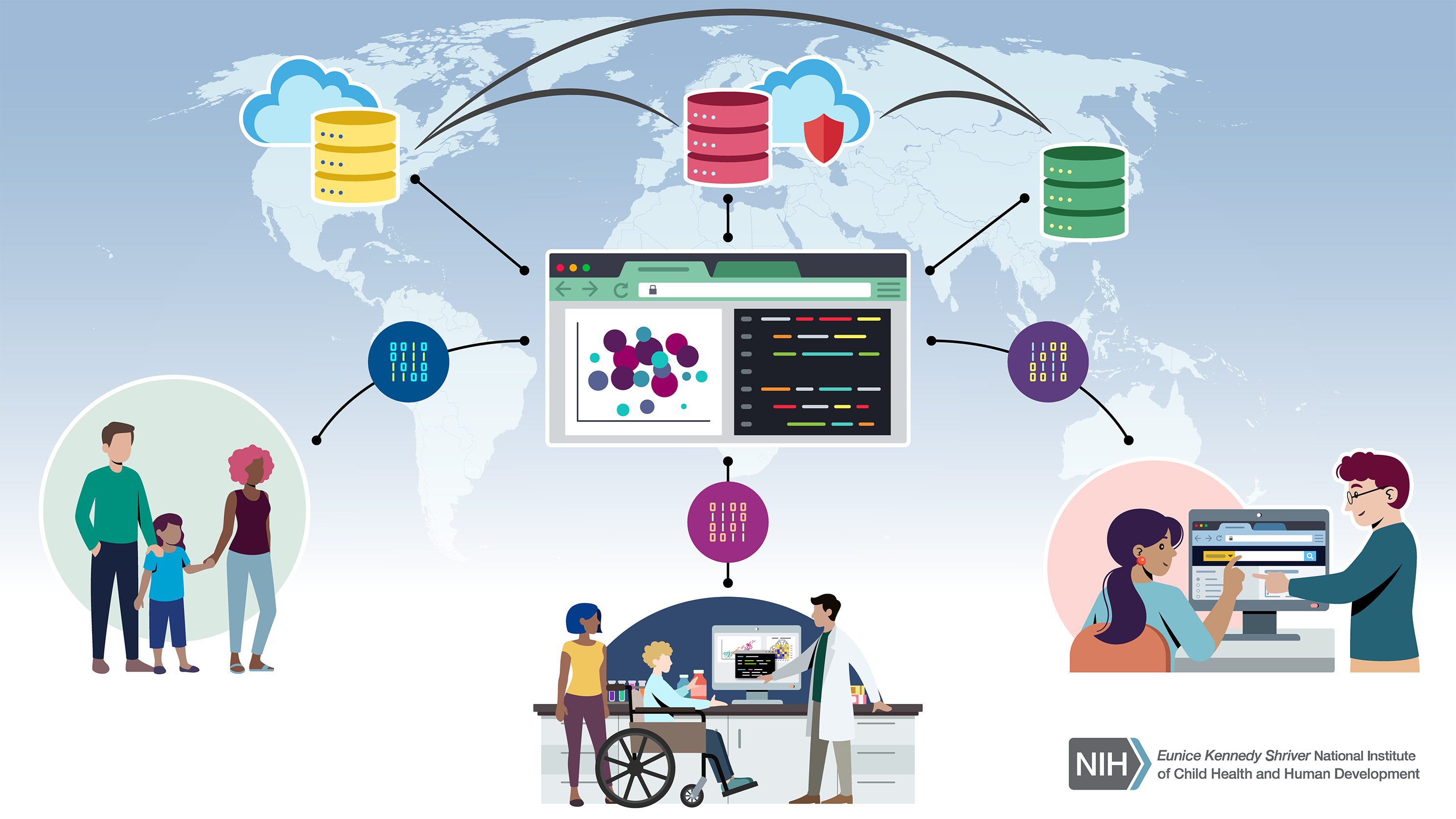 ODSS was established in 2021 to lead and coordinate NICHD’s activities within data science, bioinformatics, data sharing policy and compliance, and emerging technologies.
ODSS was established in 2021 to lead and coordinate NICHD’s activities within data science, bioinformatics, data sharing policy and compliance, and emerging technologies.
ODSS's vision is to enable a culture of responsible and innovative use of data and biospecimens that accelerates research and improves health for NICHD populations. The office's mission is to:
- Develop a diverse, secure, and interoperable research data ecosystem
- Advise on best practices and standards for data collection, management, sharing, and use across the research and funding lifecycles
- Advance scientific discovery in support of NICHD's mission to understand human development, improve reproductive health, enhance the lives of children and adolescents, and optimize abilities for all
ODSS is a trusted informational resource for NICHD staff and researchers on all NIH data and specimen sharing policies.
ODSS serves as NICHD's primary liaison with the NIH Office of the Director's Office of Data Science and Strategy, to ensure engagement in large NIH data-science and emerging technology programs and ensure alignment with NIH, HHS, and federal programs and policies.
Director Rebecca Rosen provided an overview of ODSS activities (PDF 2.2 MB) in her January 2023 Council presentation and an update on the NICHD Data Strategy (PDF 1.87 MB) in her June 2024 Council presentation.
- Rebecca Rosen, Ph.D., ODSS Director
- Valerie Cotton, B.Sc., ODSS Deputy Director
- Elizabeth Clerkin, Ph.D., Data Science and Sharing Specialist
- Stephanie Tison, Dr.P.H., Data Science and Sharing Specialist
- Tarsheka Thompson, Staff Assistant
- Elizabeth (Liz) Umberfield, Ph.D., RN, NI-BC, Research Informatics Program Manager
ODSS is a trusted informational resource for NICHD staff and researchers on all NIH data sharing policies.
The new NIH DMS Policy applies to funding applications and proposals submitted to NIH on or after January 25, 2023. The following are helpful links about the 2023 policy for the NICHD investigator community:
- Explore the NIH Scientific Data Sharing website for information on:
- Use NICHD’s Tips for Writing a DMS Plan (PDF 193 KB) to create a DMS plan for your NIH-funded research projects
- Check out the Common Issues in NIH DMS Plans to get some lessons-learned information from ODSS experience with DMS plans.
- Learn about common data standards that may be relevant to NICHD research and how adopting them can improve data usability and interoperability throughout the data lifecycle.
- Search the NICHD Data Repository Finder
to identify an existing data repository to include in your DMS plan. Data repositories relevant to NICHD researchers will be added to the tool, currently in beta version, on an ongoing basis
- Check out the following example DMS plans developed by NICHD staff:
- Human Clinical and Genomics Data (PDF 215 KB)
- Human Clinical Trial Data (PDF 179 KB)
- Human Survey Data (PDF 169 KB)
- Model Organism (Zebrafish) Data (PDF 124 KB)
- Develop informed consent language that addresses data and specimen sharing using:
- Informed Consent for Secondary Research and Biospecimens: Points to Consider and Sample Language for Future Use and/or Sharing (PDF 736 KB) developed by the NIH Office of Science Policy
- Consent Templates and Guidance that Address Storage, Sharing, and Future Research Using Your Specimens and Data developed by the NIH Office of Intramural Research, Office of Human Subjects Research Protections
- The Informed Consent Resource developed by the National Human Genome Research Institute
- Learn about the Federal Demonstration Partnership’s NIH DMS Pilot
and visit the NIH Scientific Data Sharing’s Learning Resources for DMS Policy to access presentations on this effort, including NIH’s observations from the first year of the policy.
- Read Best Practices for Sharing Research Software Frequently Asked Questions developed by the NIH Office of Data Science Strategy
DASH is the NICHD designated controlled-access data repository for researchers to share de-identified data from clinical and population health studies relevant to NICHD populations. DASH is also a portal for requesting biospecimens from selected studies.
E-updates from DASH, published quarterly, provide information on upcoming NICHD data-collection projects, studies available in DASH, including those with biospecimens, as well as other noteworthy data news.
DASH E-Updates
- January 2025 Update (PDF 360 KB)
- September 2024 Update (PDF 362 KB)
- June 2024 Update (PDF 394 KB)
- March 2024 Update (PDF 375 KB)
- January 2024 Update (PDF 409 KB)
- September 2023 Update (PDF 357 KB)
- June 2023 Update (PDF 451 KB)
- March 2023 Update (PDF 309 KB)
- December 2022 Update (PDF 279 KB)
- September 2022 Update (PDF 367 KB)
- June 2022 Update (PDF 321 KB)
- March 2022 Update (PDF 320 KB)
In collaboration with NICHD, NIH, and external stakeholders, ODSS is building a federated, secure research data ecosystem that will measurably and rapidly facilitate data sharing by NICHD-funded researchers and increase access to shared data for the entire research community.
The NICHD Data Ecosystem includes people, data, processes, and technologies that align with the NICHD Strategic Plan and that support NICHD communities’ data science and sharing needs. To inform NICHD Data Ecosystem efforts, ODSS collects "user stories" to describe these needs, which fall into the following categories:
- NICHD investigators share their data and biospecimens to encourage reproducibility and broad reuse.
- The researcher community:
- Finds and uses NICHD data and specimens to enable new and innovative research
- Securely analyzes NICHD and other data using new tools, training resources, and powerful computing resources
- Participant communities visualize outcomes of taking part in NICHD research and benefit faster from new discoveries.
- NICHD:
- Tracks researcher compliance with NIH policies and good stewardship of government funds
- Assesses and visualizes the scientific return on investment in data and biospecimen sharing
- Promotes successful sharing strategies, policies, and tools to encourage broader use and reuse
The NICHD Ecosystem Library on GitHub tracks user stories, efforts, and associated documentation to improve capabilities across the ecosystem.
ODSS is currently assessing all data repositories that NICHD researchers use to share data or access shared data for secondary use. This assessment and the communities’ user stories will inform NICHD’s approach to improving sustainability and interoperability across the ecosystem to best support the institute’s needs. The office will also use information from the assessment to update the NICHD Data Repository Finder .

ODSS leads and collaborates on a variety of projects to maximize the responsible and innovative use of data across the NICHD Data Ecosystem. Reports and materials based on these projects will be posted in this section as they become available.
- Privacy Preserving Record Linkage (PPRL) for Pediatric COVID-19 Studies (PDF 4 MB)
Led by ODSS with funding from the NIH Office of Data Science Strategy
This report describes governance and technical approaches for PPRL based on an assessment of existing record linkage implementations. The assessment was designed to address pediatric COVID-19 use cases identified by NICHD and NIH researcher communities, given the federated nature of the NIH data ecosystem. The report led to the creation of the Record Linkage Implementation Checklist, which guides users through governance and technical decisions that must be made prior to designing and implementing a record linkage strategy.
- Digitizing Data Governance Metadata Towards Streamlining Patient- Centered Outcomes Research Data Linkages
Led by ODSS with funding from the HHS Office of Secretary Patient-Centered Outcomes Research Trust Fund and with funding from the NIH Office of Data Science Strategy
The project strives to develop and test a generalizable, scalable, and machine-readable data governance metadata schema that simplifies decision-making for the responsible linkage of datasets for patient-centered outcomes research.- The Data Linkage Governance Metadata GitHub
shares documentation related to the development and testing of the data governance metadata schema to facilitate use and implementation.
- ODSS presented Digitizing Data Linkage Governance Metadata Towards Streamlining Decision Making for Patient-Centered Outcomes Research Data Linkages (PDF 2 MB) at an Office of the Secretary Patient-Centered Outcomes Research Trust Fund webinar in April 2024.
- The Patient-Centered Outcomes Research Trust Fund Pediatric Record Linkage Governance Assessment (PDF 993 KB) analyzed data governance information from 11 high-priority HHS and other federally funded datasets. The report assessed whether the datasets could be linked and, if so, what rules and controls applied to the resulting linked dataset in support of three theoretical pediatric COVID-19 research use cases, and developed a dataset-level governance information framework for structuring this information, which serves as a foundation for the development of the metadata schema. Appendix D: Governance Information Sheets and Appendix E: Linkage Determination (PDF 3 MB) contain the collected and structured governance information.
- The Governance Metadata Standards: Landscape and Gap Analysis (PDF 1 MB) assesses existing data standards relevant to data governance to inform the development of the metadata schema.
- The implementation reports, Development of a Governance Metadata Collection Tool (PDF 6 MB) and Development of a Governance Metadata Visualization Prototype (PDF 3.3 MB), describe the process of developing two prototypes to test the metadata schema’s capacity to accommodate real-world governance information about datasets.
- The Data Linkage Governance Metadata GitHub
 BACK TO TOP
BACK TO TOP